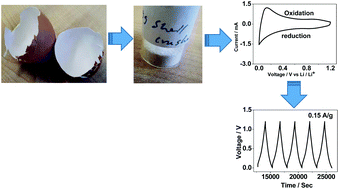Bio-waste chicken eggshells to store energy
Abstract
Bio-waste in the form of chicken eggshells, which contain high amounts of calcium carbonate (CaCO3), is used to store energy. The fine eggshell powders are used as an electrode against a metallic lithium anode in a non-aqueous electrolyte. The initial discharge capacitance of the eggshell system was found to be 232 F g−1, while the reversible capacitance was 120 F g−1. Thereon, the cell maintained an excellent capacitance retention of 92% over 1000 cycles. The electrochemical performance obtained is comparable to that of commercially available classical activated carbon (AC) material. CaCO3 showed a non-faradaic behaviour and the shape of the electrochemical curves resembles that of the AC electrode. The preliminary findings suggest that CaCO3 from eggshells can be used as the electrode in Li-ion capacitors to store and release charges effectively over a wide electrochemical stability window of 4 V. Using chicken eggshells in this manner not only reduces the amount of bio-waste, but also adds considerable value. A detailed understanding of the electrochemical and physical behaviour of the material is needed in order to improve its performance and to enable its widespread use.



 Please wait while we load your content...
Please wait while we load your content...